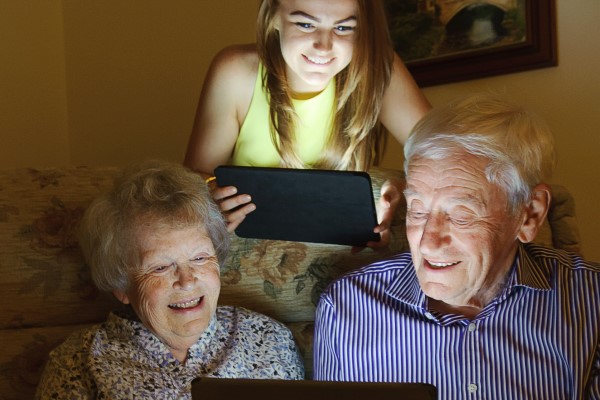Image copyright: (C) the Oddfellows
For younger people, documenting life experiences, sharing know-how and creating rich content to share on social media seems to be second-nature. This is less so for many older people. But knowledge held by older people is precious capital that must be shared, documented and transferred to other generations. We can’t let it become lost.
The University of Salford’s Search and Social Media Marketing course has challenged my thinking – how can social media play its part in helping us to achieve legacy and in enabling different generations to reciprocally benefit from the sharing of knowledge? And do silversurfers hold the potential to tip social media into a golden age of information exchange?
A way for different generations to cross-pollinate skills, life experiences and different cultures
I work for the Oddfellows – it’s a membership organisation, based in the UK. Most of our members are over 60 and we champion intergenerational learning. For me, two findings in our recent ‘Generation Games’ survey caught my attention.
Firstly, and reassuringly, rather than being at loggerheads, 97% of under 25s and 96% of over 55s enjoy spending time with one another. This explodes the myth that these two groups live completely separate lives, divided by vast cultural and technological gulfs.
And secondly, a key outcome of them spending time together is the cross-pollination of skills. A large proportion of younger people help over 55s with IT and in coming to terms with the wider cultural changes taking place in society and, in turn, over 55s pass on a mixture of softer interpersonal skills and practical know-how.
IT, smartphones and social media drive intergenerational conversations
Interestingly, you’d think advances in the use of IT, smartphones and social media platforms drive a social wedge between generations, but what they’re actually driving is conversation.
If you’re young and don’t have grandparents, or the potential to mix with someone older in your community (and vice-versa), it shouldn’t and doesn’t have to become a dead end. There’s vast opportunity to co-create, conspire and collaborate through social media.
One such organisation, the Royal Voluntary Service, has already spotted the importance and potential of enriching lives through encouraging intergenerational learning. Their GrandFest initiative is compelling stuff. In summer last year, they invited eight skilful over seventies to run craft masterclasses in London’s East End. But it didn’t stop there. Take a look at their video masterclasses:
Beer brewing expert George can show you how you can brew your own delicious beer.
Shirley and her dance partner George will show you the basic steps of the Waltz Catherine, perfect for a first dance at a wedding – Keep dancing!
This is what we need more of. And we need to encourage greater numbers of over 60s to create content themselves and then blog, and then post on YouTube, and then share on Facebook and then tweet, tweet, tweet.
Encouraging more self-generated content from older generations
The importance of initiatives such as DigitalUnite and the practical support given by organisations such as over 50s website silversurfers and Age UK really hits home.
Encouraging more self-generated content from silversurfers holds the potential for us to get even more out of social media – by ensuring published content is demographically more balanced and that it better reflects the experiences and know-how of society as a whole.
Older generations didn’t grow up in a cut and paste culture – so it’s a major tick in their potential to generate original content – which is perfect for search. But what’s critical is making sure their content has the potential to break out of the potential confines of peer to peer platforms. We need older creators to optimise. Easy-to-follow optimisation tools such as Yoast SEO come into their own here – in improving the chances of blog post content being found easily, by anyone – regardless of age.
The Oddfellows’ research speaks of the witnessing of a golden age of harmony and warmth between older and younger people. As they spend time together, it enables all parties to fuse their knowledge, pool their experience and develop their emotional intelligence. But these benefits need not be the preserve of an offline experience.
It goes without saying that social media’s potential to help us to build a more cohesive, vibrant and understanding society is vast, as it provides everyone with the opportunity to mix with different generations regardless of family set-up or geography.
Silversurvers hold the key to social media alchemy
But information exchange must be two-way. That’s the bit that’s critical here. We need to make sure that knowledge exchange is not just about older people reflecting on content created and posted by their younger counterparts. Supporting and encouraging more silversurfers to share precious, optimised knowledge is the key to social media becoming truly alchemised.
Are silversurfers social media gold? Tell me what you think…
I’d be really interested to hear comments from older individuals who are already blogging to great effect and to find out what they feel are the best ways to encourage more of their generation to get creating and sharing content online.
Tags: search engine optimisation, silversurfers, silversurfers social media, social media
Posted in search engine marketing


